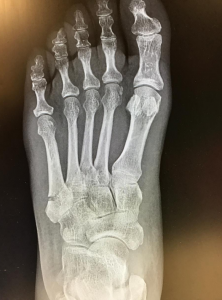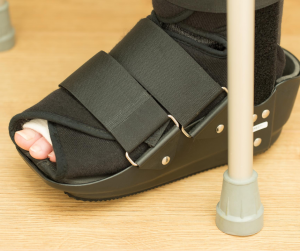
 A stress fracture is a small crack in the bone that develops gradually over time, often starting as a barely noticeable niggle or a dull ache and gradually increasing in severity. Stress fractures are not to be confused with regular fractures (your typical ‘broken bones’), which tend to occur suddenly, unexpectedly and are usually related to trauma, like falling from a height, being tackled, having a crash on your bike.
A stress fracture is a small crack in the bone that develops gradually over time, often starting as a barely noticeable niggle or a dull ache and gradually increasing in severity. Stress fractures are not to be confused with regular fractures (your typical ‘broken bones’), which tend to occur suddenly, unexpectedly and are usually related to trauma, like falling from a height, being tackled, having a crash on your bike.
Stress Fracture Signs & Symptoms
If you have a stress fracture, it’s likely that you won’t be able to pinpoint the moment or event where your pain started. A common story is that you’ll recall that at some point an ache in your feet or legs began, which felt worse during weight-bearing or physical activity and better during rest. It will have been generally ignored as you continued to partake in your regular activities, and over time, the intensity of the pain will have increased until it reaches a significantly painful and uncomfortable level.
The pain will be localised to the area where the fracture has occurred and may radiate up or down the bone. Stress fractures often occur in the lower limbs because of the impact forces and stress on these bones during physical activity and everyday life. Common sites of stress fractures in the feet and legs include the shin bone (tibia), the long bones of the feet (metatarsals) and the heel bone (calcaneus).
What Causes A Stress Fracture?
 When a bone is placed under excess pressure and stress repetitively in a specific area, a fracture can develop in that area. This means that any activity that overloads the bones of the feet and legs can lead to a stress fracture. Other risk factors include:
When a bone is placed under excess pressure and stress repetitively in a specific area, a fracture can develop in that area. This means that any activity that overloads the bones of the feet and legs can lead to a stress fracture. Other risk factors include:
- Poor or unsupportive footwear
- Training on hard surfaces
- A sudden increase in intensity or duration of high-impact physical activity
- A poor gait pattern or a poor training technique
- Poor foot posture and foot problems like bunions and joint deformities
- Decreased bone strength or density, including from conditions like osteoporosis
- Muscle weakness and imbalances that may alter foot posture and function
- Vitamin deficiency, including vitamin D and calcium
How Is A Stress Fracture Treated?
It’s very important to treat stress fractures as early as possible. This is because stress fractures can continue to grow bigger if they’re not properly managed, and the larger a fracture, the more painful it is and longer it takes to treat.
The first step is ensuring that you have the right diagnosis. If you’re looking for your stress fracture to show up on an x-ray – you may be waiting a while – x-rays can take weeks, if not over a month, to show a new stress fracture.
 Treating stress fractures means addressing the cause – the repeated stress and pressure to the damaged bone. We’ll work with you to help the fracture heal effectively while helping prevent it from recurring in the future. This may mean:
Treating stress fractures means addressing the cause – the repeated stress and pressure to the damaged bone. We’ll work with you to help the fracture heal effectively while helping prevent it from recurring in the future. This may mean:
- Using good, supportive and cushioning footwear to help reduce the forces and impact on the feet and legs
- Avoiding or adjusting any activities that are causing you pain and contributing to the fracture
- Using custom foot orthotics to help with any biomechanical or postural issues that may be contributing to your fracture
- Physical therapy if any muscle weakness or tightness may be contributing to your injury
- A moon boot or air walker if the fracture is severe and needs significant offloading
Preventing Stress Fractures
To help prevent stress fractures from recurring, make sure you:
- Choose supportive sports shoes with sufficient cushioning, and replace them when they wear down
- Combine low-impact physical activities with high-impact activities where possible, especially when changing your exercise routine
- Correct any problems and inefficiencies with your lower limb biomechanics, including foot posture and gait
- Be mindful of conditions and nutritional deficiencies that may make you vulnerable to stress fractures
Most importantly, don’t ignore pain and niggles when they start – treat problems early before they get worse. To book an appointment with our experienced podiatry team, call us on 1800 FOOTDR or book your appointment online.



